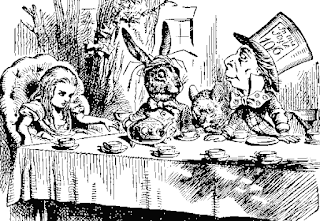"Professor Eucalyptus said, "The search
for reality is as momentous as
The search for god." It is the philosopher's search
For an interior made exterior
And the poet's search for the same exterior made
Interior: breathless things broodingly abreath
With the inhalations of original cold
And of original earliness. Yet the sense
Of cold and earliness is a daily sense,
Not the predicate of bright origin.
Creation is not renewed by images
Of lone wanderers. To re-create, to use
The cold and earliness and bright origin
Is to search. Likewise to say of the evening star,
The most ancient light in the most ancient sky,
That it is wholly an inner light, that it shines
From the sleepy bosom of the real, re-creates,
Searches for a possible for its possibleness.
-Wallace Stevens
from "An Ordinary Evening in New Haven"
The Last MAGA Prisoner
4 hours ago
